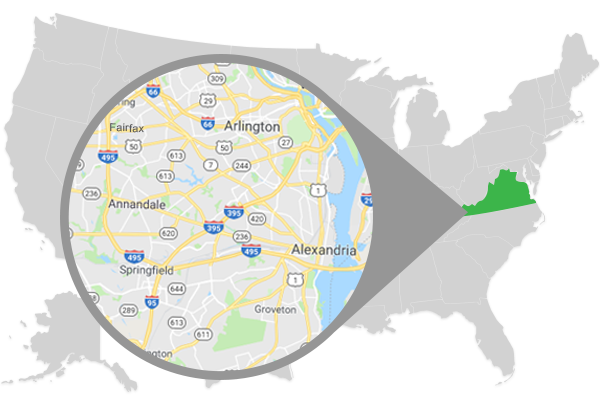How to prevent or resolve conflicts with wildlife
As human populations continue to rise and move into traditional wildlife habitat, human/wildlife contact is becoming more prevalent. This section provides general information and techniques for Virginia property owners when wildlife becomes a problem.
Below are some easy techniques which will usually solve the problem and prevent it from re-occurring:
- If you are feeding wildlife, stop. This will cause them to lose their natural fear of humans.
- Keep trash inside until the morning of trash pick-up or place trash in an animal-proof container, such as a metal trashcan with latches on the lids.
- Do not leave pet food outside; keep pet feeding areas clean.
- Remove bird feeders when problem species, such as bears, have been seen around them.
- Close up all openings under and into your buildings. Animals look for places to den and raise their young—don’t give them that opportunity.
- Clear overhanging tree limbs and branches which may be providing wildlife access to structures.
- Clear fallen fruit from around trees.
- Pass along this information to your neighbors. If anyone in the neighborhood is feeding wildlife directly, or indirectly, it can cause trouble for everyone.
- Reflective tape, lights, or noise sometimes works, but they will eventually grow accustomed to these methods, so this is only a temporary solution.
- Electric fencing can be very effective in keeping wildlife out of crops, beehives, and structures.
- It is illegal in the State of Virginia to trap and relocate an animal to another area.
If these techniques do not solve the problem, you can contact us or another licensed trapper or a critter removal service which you can find in your local phone directory.
If you are experiencing a problem with wildlife, please contact Summit Environmental Solutions (SES) at 703-520-5868.
The following are the Virginia laws and statute per wildlife group.
Raccoons
- No Kill Permit Required from Department to kill on your own land during the closed season.
- You must contact the Commonwealth Attorney’s office in your county/city for information regarding legal methods of animal removal. Local ordinances are usually more restrictive than state laws.
- There is a continuous open trapping season in the following localities: Arlington, Chesterfield, Fairfax, Henrico, James City, Loudoun, Prince William, Spotsylvania, Stafford, Roanoke and York Counties. However, you must have a trappers license.
Bats
In Virginia, it is illegal to:
- transport, release, or relocate a bat anywhere other than the property it was caught on (4VAC15-30-50), and
- poison any animal (including bat) other than rats and mice on your property (4VAC15-40-50).
It is a Federal offense to:
- “harass, harm, pursue, hunt, shoot, wound, kill, trap, capture, or collect, or to attempt to engage in any such conduct” any endangered or threatened species. (Endangered Species Act)
Coyotes
- No Kill Permit required from VDGIF.
- Nuisance Species – continuous open season.
- You must contact the Commonwealth Attorney’s office in your county/city for information regarding legal methods of animal removal. Local ordinances are usually more restrictive than state laws.
Foxes
- No Kill Permit Required from VDGIF.
- The landowner may kill on his own land during the closed season.
- You must contact the Commonwealth Attorney’s office in your county/city for information regarding legal methods of animal removal. Local ordinances are usually more restrictive than state laws.
Skunks & Opossums
- No Kill Permit required from VDGIF.
- The landowner may kill on his own land during the closed season.
- You must contact the Commonwealth Attorney’s office in your county/city for information regarding legal methods of animal removal. Local ordinances are usually more restrictive than state laws.
Snakes
- You may keep up to 5 individuals of any species of reptile or amphibian for personal use, except:
- No threatened or endangered species, and
- There is a ban on collecting northern diamond-backed terrapins, spotted turtles, and eastern hellbenders (even though these species are not threatened or endangered, there is a specific regulation banning their collection).
- When keeping venomous species for personal use, check with your locality’s (city or county) ordinances regarding keeping such species. (4VAC15-360-10)
- 4VAC15-30-10. Possession, importation, sale, etc., of wild animals. Under the authority of §§ 29.1-103 and 29.1-521 of the Code of Virginia it shall be unlawful to take, possess, import, cause to be imported, export, cause to be exported, buy, sell, offer for sale, or liberate within the Commonwealth any wild animal unless otherwise specifically permitted by law or regulation.
Squirrels
- No Kill Permit required from VDGIF if the landowner is killing for their own use during the closed season.
- You must contact the Commonwealth Attorney’s office in your county/city for information regarding legal methods of animal removal. Local ordinances are usually more restrictive than state laws.
If you are up for a challenge, then this is the group for you. With the right motivation (say, sunflower seeds in a feeder) squirrels will learn to work around just about any known obstacle placed in their path. Empty birdfeeders are only one problem created by squirrels. Another is when they take up residence in your attic or chimney. Flying squirrels are most notable for inviting themselves in. Here are a couple of problems and associated solutions.
Woodpeckers
- State protected non-game species and protected under the Federal Migratory Bird Treaty Act.
- Cannot destroy or harm.
- In Virginia, it is illegal to:
- molest or destroy a woodpecker nest and/or eggs. § 29.1-521.
- trap any woodpecker § 29.1-530
- kill a woodpecker anytime §§ 29.1-100, 29.1-513
- poison any animal (including woodpecker) on your property. 4VAC15-40-50
- It is a Federal offense to:
- possess, sell, deliver, carry, transport, or ship a Red-cockaded woodpecker since it is an endangered species (Endangered Species Act)
- possess, sell, deliver, carry, transport, or ship any woodpecker or woodpecker part since they are classified as a migratory species. (Migratory Bird Treaty Act)




